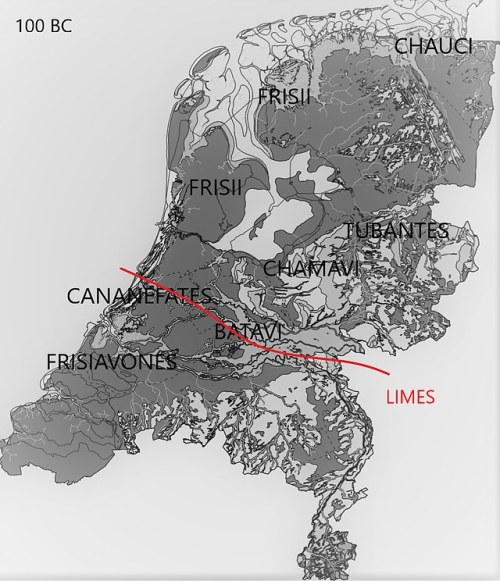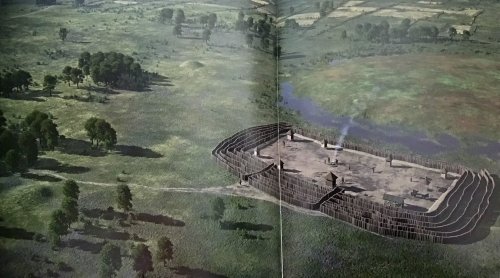FrisiiThis is a rewritten post on the Frisii tribe, my previous post is over a year old so I wanted
FrisiiThis is a rewritten post on the Frisii tribe, my previous post is over a year old so I wanted to update it by adding more information. The Frisii were a Germanic tribe who lived above the Rhine in areas that are now known as modern day Noord-Holland, Friesland, Groningen, the Wadden islands in the Netherlands and East-Frisia in Germany. They should not be confused with the Frisians, a tribe which settled in the same area at a later time period, The Frisians and Frisii are however not completely foreign to each other, some Frisii stayed behind and were absorbed by the Frisians, the oldest still existing Germanic culture. The Frisii were neighboured by the Cananefates to the south and Chauci to the east, the west and north were part of the north sea. The meaning of their name is derived from the Proto-Germanic word ‘frisaz’ which means 'curly’. There is a common misunderstanding that the word Frisii, and the later Frisian, comes from the word freeze/vriezen or freedom but this is not correct although understandably a good possible meaning. The origins of the Frisii is still a bit unclear but there are viable theories. Unlike other tribes, like the Chatti, Lombards, Batavi, Cananefates etc.. who all migrated southwards and settled in their territories around 100BC, the Frisii are a lot older. In fact we do not know how old exactly they are but there are several theories:The most likely theory is that the early Frisii, also called Proto-Frisians, migrated southwards from northern Germany and Denmark around 1000BC. Somewhere around 700BC they migrated from modern day Drenthe towards modern day Friesland, Groningen and Noord-Holland. There is however a more controversial theory that suggests the birth of the Frisii started with their patron-mother the Goddess Freya. According to this theory a line of matriarchal rulers, known as folk mothers, were descendants of Freya herself and responsible for the creation of the Frisii, this would mean that the origin of the tribe is not around 700BC but around 2200BC. Here is a line of Frisii folk mothers starting with the Goddess Freya:Freya - somewhere around 2000BCFasta, Medea, Thiania, Hellenia, Minna, Rosamond, Hellicht, Frana, Adela and Gosa. Of course if there was a continuous matriarchal line for about 1500 years long, this would include many more names but those are lost in time. This theory is based on the information found in the Oera Linda book, a highly disputed manuscript worthy of its own post so I will write about it in the near future. An altar stone has been found near modern day Xanten however with the following description: “MATRIBUS FRISAVIS PATERNIS” which could refer to these ancient Frisii matriarchs making the Oera Linda book theory possible. By 100BC the Frisii were quite a large and powerful tribe who had established themselves fully in their current territory. Their first encounter with the Roman empire was around 12BC when Drusus Germanicus, one of Rome’s most succesful generals, invaded Germania with the intention to turn the land into a province of Rome. Drusus Germanicus, not to be confused with the other Roman general called Germanicus, was incredibly succesful with his invasion. He subjugated every Germanic tribe in his path including the Frisii who were forced to be allies of Rome. The Romans also built a fort, their most northern one, at modern day Velsen to keep an eye on the Frisii. It is likely that all of Germania would have become a Roman province if Germanicus didn’t die after a fall from his horse in 9BC. The Frisii delivered auxiliary troops to Rome and they had to pay taxes which led to high tensions between the tribe and Rome. The taxes were incredibly unfair as the Romans demanded large skins of cows which did not even exist in Frisii territory, they only had a small breed of cows. This rising tension eventually led to the Frisii revolting against Rome in 28AD. The Frisii hung Roman tax collectors which infuriated Rome.Olennius, a Roman centurion in charge of Frisii administration, escaped the lynching party and hid himself at Castellum Flevum, the most northern fort the Romans ever built. The Frisii however marched onwards to this fort but were unable to capture it, archeological research shows traces of heavy fighting at this fort. The Frisii retreated back towards their sacred grove dedicated to their Goddess of war, Baduhenna, luring the Romans with them. The Romans chased the Frisii right into the sacred grove. This was however a dreadful decision since the Frisii knew their swampy estuary terrain very well and were extra motivated by being in the presence of their battle Goddess. Almost all of the Romans were slaughtered, 900 of them, some according to legends, were captured and sacrificed to Baduhenna right in her grove. Another 400 Roman soldiers killed each other out fear of treachery, the event has been quoted by Tacitus: “Soon afterwards it was ascertained from deserters that nine hundred Romans had been cut to pieces in a wood called Baduhenna, after prolonging the fight to the next day, and that another body of four hundred, which had taken possession of the house of one Cruptorix, once a soldier in our pay, fearing betrayal, had perished by mutual slaughter.” - TacitusThe Frisii name thus became famous in Germania and Roman emperor Tiberius tried to keep the Roman defeat a secret, not wishing to entrust anyone with the war because of the shame. The Roman fort in modern day Noord-Holland was abandoned after the revolt and the Frisii became free people once again and remained so until the medieval ages. The earliest known written record that we have about the Frisii comes from a Roman poet Albinovanus Pedo. In one of his poems, he describes a disaster that occured during Germanicus’ campaigns to avenge the Teutoburgerwald battle. This disaster took place around the Eems river in Frisii territory around 16AD and involves a storm destroying parts of his fleet:“For a long time they had left the day and the sunlight behind them, for a long time they looked exiles from the well known part of the world, who had dared to go through forbidden darkness to the boundaries of nature and the furthest coast of the earth. From here they saw him, the sea, carrying huge monsters under slow waves with rising wild whales and the dogs of the sea on all sides grabbing ships. The fleet was already in the mud, left behind by a rapid storm. They believed that their unfortunate fate was to be torn apart by these wild sea monsters. The world was robbed, nothing could be distinguished, his breath was taken from him, and thus he spoke from his heart:Where do we end up? The day itself is fleeing and nature closes the rest of the world with eternal darkness. Do we sometimes look for people untouched by wars? The gods call us back, forbid that mortal eyes see the end of everything. Why do we violate a strange and consecrated sea with oars? Why do we disturb the silent dwellings of the gods?”- Albinovadus PedoThe next written mention is quite an interesting one. It involves a dispute about land on the Roman border area. Two Frisii leaders, Verritus and Malorix decided to travel to Rome in 58AD and defend their case about this piece of land. During their stay in Rome, they amused the Romans greatly by refusing to sit down amongst the common people in a theater exclaiming that: “No people can match the Germanics in loyalty and bravery!” They then proceeded sitting down next to the Roman senators present in the theater. The Roman emperor, Nero, found the whole event quite amusing himself and granted Verritus and Malorix roman citizenship.This account, described by Tacitus, is also the first account of foreign tourists visiting Rome who were mentioned by name. In 69AD, during a particulary tough year for the Romans, the Batavi revolted against the Roman empire. The Frisii joined this revolt which was initially quite succesful. Unfortunately the revolt was put down by the Romans the following year, resulting in severe trust issues between the Romans and the Batavi and Cananefates. By 98AD Tacitus published his work 'Germania’ and also provices us with a small description on the Frisii. He separated the tribe in two parts, the Frisii Maiores and the Frisii Minores. The Minores lived in what is now Noord-Holland and the Maiores lived in what is now Frisia and Groningen. Here is a description on the Frisii landscape:“The terrain is fierce, the climate is rough, life and landscape are bleak. You only come here if it’s your homeland.” - TacitusNo significant recorded events exist after 98AD, the history on the Frisii between 100AD-300AD is pretty much unknown. We do know that parts of the Frisii joined the Cananefaat pirate/proto-viking Gannascus in his raids on several settlements, mainly in Gaul. These attacks infuriated Rome and led to improved defenses being built by them. Gannascus is eventually assassinated by the Romans under the pretence of a negotiation which caused great outrage amongst the Chauci, Frisii and Cananefates. The Roman emperor of that time, Claudius, feared a violent conflict with these tribes and withdrew Roman forces from the Rhine in order to ease tensions. Around 300AD the Saxon confederation came into existence and bordered the Frisii directly to the east. The Western Roman empire started to decline rapidly during this time period as well leaving the borders vulnerable for invasions. With the Huns invading Europe, economic hardship, climate change, failed harvests and empty Roman borders, came the great migration. Many Frisii migrated either southwards to become absorbed by the Franks or to the west by invading Britannia together with the Angles, Saxons and Jutes. Only very few Frisii remained in their original homeland, we have archeological evidence that some did indeed stay. Frisii lands were now almost completely deserted until the arrival of Saxons and Jutes who settled the area together with the few remaining Frisii. These new settlers started to call themselves Frisians, after the ancient Frisii. The Frisians still exist until this day and they have a rich history which deserves a post of its own, which will be coming very soon. The last thing I want to mention is the auxiliary troops that the Frisii supplied Rome with. The Notitia Dignitatum, a Roman document that describes details of the administrative organisation of the empire, mentions a Frisii cohort stationed at Vindobala, a fort located at Hadrian’s wall. This entry 'Tribunes cohortis primae Frixagorum Vindobala’ however contains a possible spelling mistake, Frixagorum instead of Frisiavonum. This entry might however also refer to the Frisiavones tribe unrelated to the Frisii. Here are images of:A map showing the location of the Frisii,A reconstruction of Castellum Flevum,A depiction of the Frisii fighting Romans by an unknown artist,A reconstruction of a Frisii fortification,A small piece of a Roman helmet, bottom left, found at Velsen where once the Castellum Flevum stood which was attacked by the Frisii, A depiction of the Goddess Freyja, the ancestral mother of the Frisii, from 1874, -- source link
Tumblr Blog : germanicseidr.tumblr.com
#history#germanic#germanic tribe#frisii#freyja





